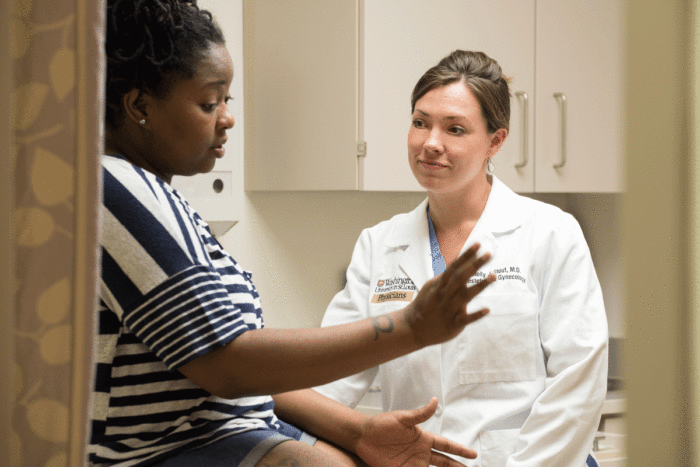Makeup of vaginal microbiome linked to preterm birth
Study conducted in primarily African-American population
 Robert Boston
Robert BostonPatient Erica Smith (left) talks with Molly Stout, MD, during an appointment at the Center for Advanced Medicine. Stout, an assistant professor of obstetrics and gynecology at Washington University School of Medicine in St. Louis, led a study of predominantly African-American women that showed, early in pregnancy, a decrease in the diversity of vaginal microbes in women who delivered early.
More than 10 percent of babies in the United States are born prematurely, yet very little is know about the underlying causes. Vaginal infections long have been thought to be related to preterm birth, prompting researchers to look at the mix of microbes in the vagina during pregnancy.
In a study of predominantly African-American women — who have a much higher rate of delivering babies early compared with other racial groups — researchers at Washington University School of Medicine in St. Louis showed that a decrease in the diversity of vaginal microbes of pregnant women between the first and second trimesters is associated with preterm birth.
“We now know there is a difference in the vaginal microbes of women who are going to deliver early, and this study also showed us that these changes happen far earlier in pregnancy — months before delivery — than we expected,” said Molly Stout, MD, an assistant professor of obstetrics and gynecology and the study’s lead author. “We wanted to study this problem in a predominantly African-American population because their rates of preterm birth are much higher than in other groups.”
Women at risk of preterm birth are treated with broad strokes, including hormones or antibiotics, bed rest and a surgical procedure that closes the cervix during pregnancy. The new findings could help researchers design more targeted therapies — focused on the microbiome — to prevent women from delivering their babies early. Stout said some future interventions might include prescribing therapies to alter the microbiome in pregnant women; predicting early delivery to get patients in rural areas who are at risk of preterm birth to tertiary care centers before delivery; and giving women steroids before delivery to help their babies survive.
The study is available online in the American Journal of Obstetrics & Gynecology.
Stout and her team studied 77 pregnant women, 24 of whom delivered at least three weeks early. The researchers analyzed the vaginal microbiome by obtaining vaginal swabs at routine prenatal visits and sequencing the DNA of the microbes on the swabs. Of the 24 women who delivered early, 16 (66 percent) were African-American and eight (33 percent) were non-African-American.
The researchers determined that women whose pregnancies went to full term maintained a stable amount and diversity of vaginal microbes, while pregnant women who delivered their babies early experienced decreases in the amount and diversity of such microbes between the first and second trimesters.
“Almost 400,000 babies are born prematurely in the United States each year, and these births have lifelong consequences,” Stout said. “The sooner we figure out what is going wrong in a pregnancy in which a woman delivers early, the sooner we will be able to design new treatments to help women carry their babies to full term.”






